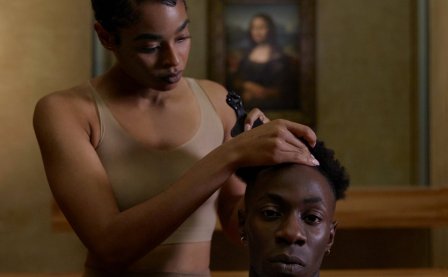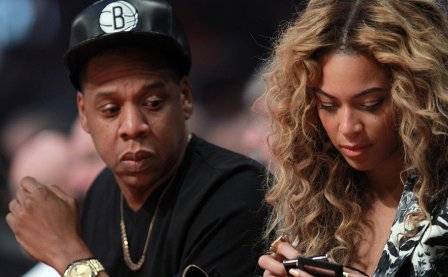If you’ve been patiently anticipating the release of Beyoncé’s newest album, 4, then you’ve no doubt come across a fair amount of grousing, grumbling, and complaints. When she wasn’t busy re-appropriating Major Lazer, she was ripping off Italian choreographers at the Billboard Music Awards and charting lower than Destiny’s Child alumna Kelly Rowland. The commercial performance of “Girls (Who Run the World)” might’ve been dismal enough to depress even the sunniest poptimist, but one failed single — satisfying, though lazy as mixtape material — is hardly reason enough to condemn to the glue factory a workhorse who has, to date, enjoyed 15 years of success in a cruel, cutthroat industry. Beyoncé is one of the only remaining worldwide sensations, a diva who has more than earned her mononomial recognition; to underestimate her is to appear sour or stupid, or both.
And so it should come as no surprise that 4 is hardly the debacle some have predicted; to the contrary, it’s difficult to imagine any long-standing admirer feeling even the slightest disappointment with the record. True, it does not contain a single as immortal or immediately recognizable as “Crazy in Love” or “Single Ladies,” but it also contains far less filler than the albums that feature those blockbusters. In many ways, 4 most closely resembles B’Day, Beyoncé’s sophomore stumble: neither record possesses a clear thematic concept or authorial voice, but both display Beyoncé’s willingness to experiment with more adventurous sounds, sometimes at the hazard of irritating her more conservative fans.
Beyoncé hasn’t produced anything as ferocious (or obnoxious) as “Ring the Alarm” on her fourth album, but “Countdown,” a maximalist dancehall-cum-Baltimore drum banger, comes close. Packing steel drums, regal fanfare, a stealthy Boyz-II-Men sample, and the most exuberant vocal performance of the album into a deliciously overstuffed three and a half minutes, “Countdown” sounds like the work of an artist who is trying too hard to produce a classic (see: My Beautiful Dark Twisted Fantasy), but over-eager as it might be, the song succeeds at what it sets out to achieve: It annoys its way into your heart.
Aside from the aggressive rhythms of “Countdown” and “Girls,” 4 is, for the most part, a slow-building, slow-burning growth spurt of an album. Of its 12 tracks, only “I Was Here” and “Best Thing I Never Had”are aligned along Nathan Rabin’s “I’m awesome. Fuck you.” thematic axis. In fact, over the first three songs — the strongest run of the whole album — Beyoncé sings with startling sensitivity and wounded humanity. Though her expressions of longing and regret are most likely contrived or altogether artificial, she sells them convincingly. If sung by anyone else, “I Miss You” — co-written by ascendant star Frank Ocean — would be a thin wisp of a ballad, all tinny drum pads and ambient synths, but Beyoncé allows her voice to crack at the right moments, moving tenuously, self-consciously through the soft, circular melody.
There’s a clear sense of self-awareness at play on 4. The most emotional moments are designed to evoke Beyoncé’s biography: her no-longer-secret marriage to “business, man” Jay-Z; the dissolution of the partnership with her svengali father; the fickle ebb-and-tide of super-stardom; and her fast-approaching expiration date, the one stamped, unfairly but inevitably, on every female sex symbol. The album credits reveal that Beyoncé’s input into the writing and production of these songs was minimal at most, but regardless of that fact, these songs have been carefully tailored to fit her image, her persona, and on that level, they succeed better than most ghost-written autobiographies. The Dianne Warren-penned “I Was Here” is a heavy brick of a song — overwrought, maudlin, delusionally grandiose — but it is also disarmingly honest about the addictive, undignified dimensions of fame and celebrity. Even a trifle like “Love on Top” — straight-up 80s cheese homage — sounds like the work of an adult.
Not that the old, less polished Beyoncé doesn’t peek through the curtain of maturity from time to time. When she strangles the words “it sucks to be you right now” on “Best Thing I Never Had,” it’s hard not to hear a middle-schooler telling off her boyfriend on the playground pavement. And the less said about the phrase “swag goo” the better; “Party,” the song on which those unfortunate words appear — Kanye West providing that unfortunate pun — is otherwise wonderful, but yet some errors are too grievous to forgive.
No matter how 4 performs commercially, the album is a perfect summertime treat, one of the most consistent and enjoyable mainstream pop records in years. Depending on one’s tolerance for vocal histrionics — and, to be honest, R&B in general — mileage may vary; but putting matters of personal taste aside, it’s refreshing to hear a pop album that aims for maturity, that doesn’t hitch its post to the Britney/Gaga/Ke$ha Euro-pop bandwagon, and that satisfies despite some minor stumbles. Credit is due as much to the writers and producers as it is to Beyoncé; 4 wouldn’t work without the presence of The-Dream, Tricky Stewart, or Shea Taylor. Their guidance ensures that every hook, no matter how silly or subtle, sinks in.
Pop music doesn’t play by the same rules as other genres, and there is rarely, if ever, a purely artistic motivation or auteurist merit. And as far as pop music is concerned, Beyoncé is very nearly without peer; she sells the words and work of others, like it was the only thing that ever mattered to her. And maybe it is; stakes are high for Beyoncé, and as she gets older, they only get higher. But once again she has risen to the challenge, delivering an imperfect album, but one that is her least flawed so far. Despite some shortcomings, 4 is an unqualified success in the Hawksian sense: There are at least three great songs and no bad ones. So please, if you would, stop grumbling.
More about: Beyoncé




